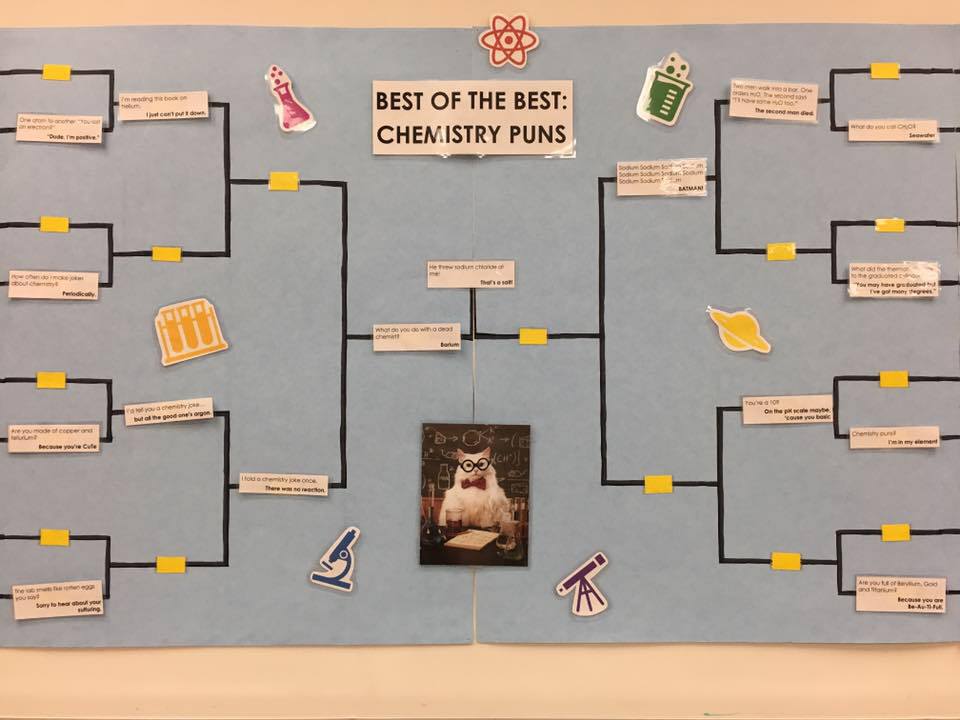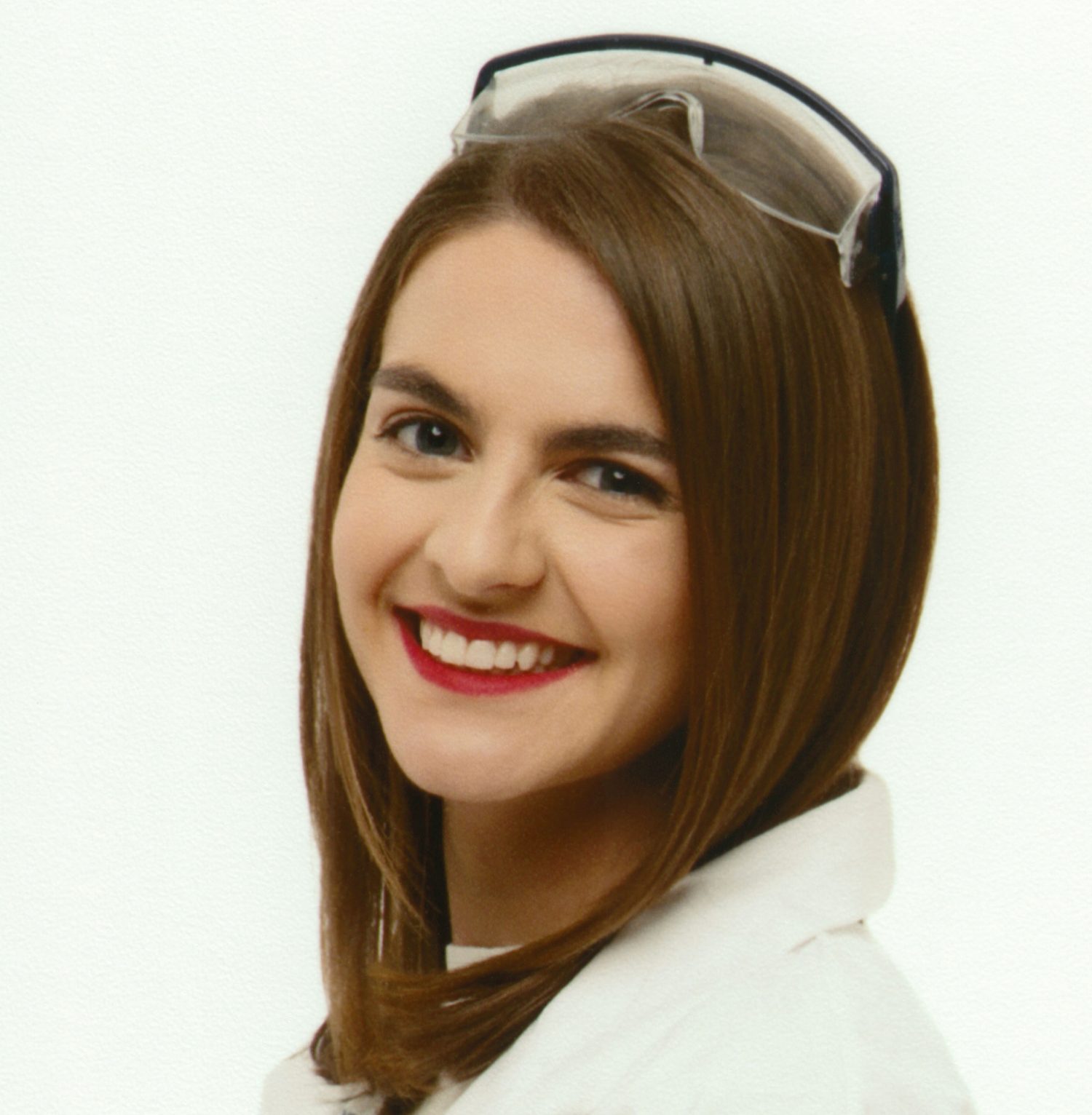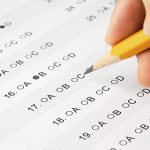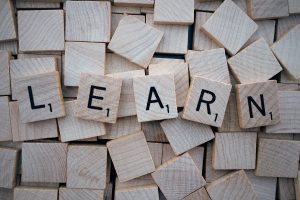This week has been a busy one! Lots of lessons, feedback and learning, for both my students and myself. I’ve found myself wanting to do more every day, finding ways to improve each lesson and activity. I have found that I am overall feeling better after my lessons and am second-guessing my choices less frequently. Now I only reflect and think of ways to improve rather than harshly criticizing my choices. I want more – more learning, more teaching, more fun. I have been enjoying everything so much, I don’t want it to end!
Highs:
- I had a lesson on protein synthesis as part of my Science 10 biology unit that went extremely well. I wanted to try something new. I made the class completely interactive. I pushed all of the tables to the sides of the room and set up the chairs facing the front like a stage. The idea was that the class would work together to crack two codes: an analogy and then DNA. On the overhead was a code – a keypad with each number a specific colour. This code was locked away in a Vault and could not be taken out, but we needed the code in our hands to decode it. Students suggested we make a copy of the code which we did by matching the colour of the code and attaching a piece of paper onto a string to make a long chain of colours. This was then taken to the Workshop where it could be decoded. A Supplier had Parts, that had a decoding scheme of three colours to one part. The Workshop would indicate the three colours and the Supplier would find the correct Part, which was a piece of a puzzle of a car taped to the board. The idea was that the one code created only filled in parts of the puzzle. This was analogous to protein synthesis. We moved onto a code of DNA locked away in the nucleus. We had to make a copy of DNA, but used complementary bases to create the mRNA (A-U, C-G). The mRNA was then taken to the ribosome where transfer RNA would find the correct amino acid and create a protein. Students worked together to summarize the lesson on a graphic organizer. The students really understood the lesson and I am extremely proud of how well it went. I had very positive feedback from students, both verbal and in their journals. Some of my favourite quotes from the journals are below:
“I love learning about things such as genetics because it’s interesting to understand our body. It’s really helpful when we do activities (as we did today) because it gets everyone involved and you kind of forget that you’re learning. It is also a lot more fun than reading from a textbook.”
“I really like how you taught the lesson. It really made the process stick and made it more fun (not that science isn’t already fun, most of the time). I’d say that today’s lesson made me happier and like this unit a bit more. I feel confidence about this topic”
“The unit is going fantastic. For once I have a clue on whats going in. The teacher is really nice and understanding. I feel as if I can get an A if I actually do my homework.”
- One of my main goals every week is to connect more with students. I focused this week on students who have been struggling concepts or with handing in assignments. It also helped that I received some IEPs so I could better adapt my class to students who need additional support. I had some struggling students reach out for additional help. I think that a few of these students and I connected over humor and I had them really engaged in the classes this week as volunteers or answering questions. I am hopeful that I can continue building these relationships so that these students can meet their goals. As much as I am hopeful, I do constantly feel like I haven’t done enough. I need to figure out how to support my ELL students and my learning assisted students more. I don’t feel like I have done enough and that it is hindering their progress significantly.
- A fun part of my daily routine is engaging students in a voting tournament. The first tournament was to see what the Best Chemistry Pun was. Two puns were posted on the overhead and students had to vote on which was better to advance to the next round. On Friday, we finished the tournament to find our winner: He threw sodium chloride at me! That’s a salt. Our next tournament begins Monday with Ultimate Disney Movie of All Time, which the students chose and gave suggestions for movies to be included. Everyone is very excited for it. I had some students thank me for putting in so much extra effort in making this. Another teacher had a conversation about me with some students and they made comments about me doing so much extra work and that while they liked it, they wondered if I had a life. The teacher had to inform them that as a student teacher, no, you don’t. She’s right. But I’m not complaining!

Lows:
- After being confident that my health would stay strong as others around me dropped like flies, I got sick. And sick I was. My body tends to overreact to colds and so I often get fevers and chills. With all the other teachers coming in sick, I knew that I could too. It is difficult teaching while sick. I wanted to be my high energy excitable self but it was too draining. I felt that my classes went by slower and everyone was disappointed in the level of engagement. I was honest with my students and told them I was sick and that I didn’t have the same energy level or voice, and they were very respectful and would quiet down themselves when they saw that I was waiting because I couldn’t raise my voice.
- I learned that my vocal chords are not able to withstand all the talking I do. It has been made worse by my cold, but I go home at the end of the day with an extremely strained voice. I need to learn to keep my voice down during class as my well-being needs to be maintained.
- I am still having issues with time management in classes. I have not yet figured out how much I am capable of doing in a class. I’m frequently pushing back lessons, and I’m uncertain how I can cover the content if this happens. I know it is happening because I have so many in-class activities, and I’m wondering if the frequency of them is useful. I also have been focused a lot on the little picture and all of the details of content. I have forgotten about the big picture and our inquiry question. A goal for next week is to bring that into three of the lessons. I want to make the learning relevant. Students are asking for relevancy and I feel as if I have been failing them.
Most important lesson of the week: I am only human. I get sick. I get tired. I am not capable of doing everything I want to do, but because I am aware of it, I strive to do more. I push to engage every single student. I push to have each class be full of fun and meaningful learning. I push for students to understand every concept. I push and push and push, but I am only human. I can accept where I cannot go above and beyond, but it doesn’t mean I still can’t try.




 Station 3: Study Strategies – Flash Cards, Summary Notes, Elaboration
Station 3: Study Strategies – Flash Cards, Summary Notes, Elaboration

 With all of the snow we had this week, my five days turned into two! Even though I taught very little I sure did learn a lot about adaptability and flexibility.
With all of the snow we had this week, my five days turned into two! Even though I taught very little I sure did learn a lot about adaptability and flexibility.